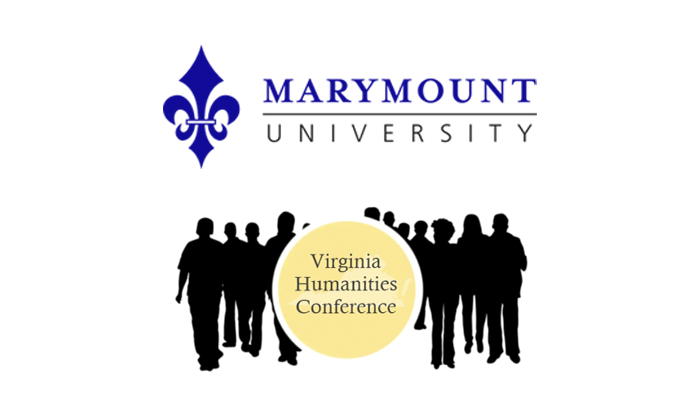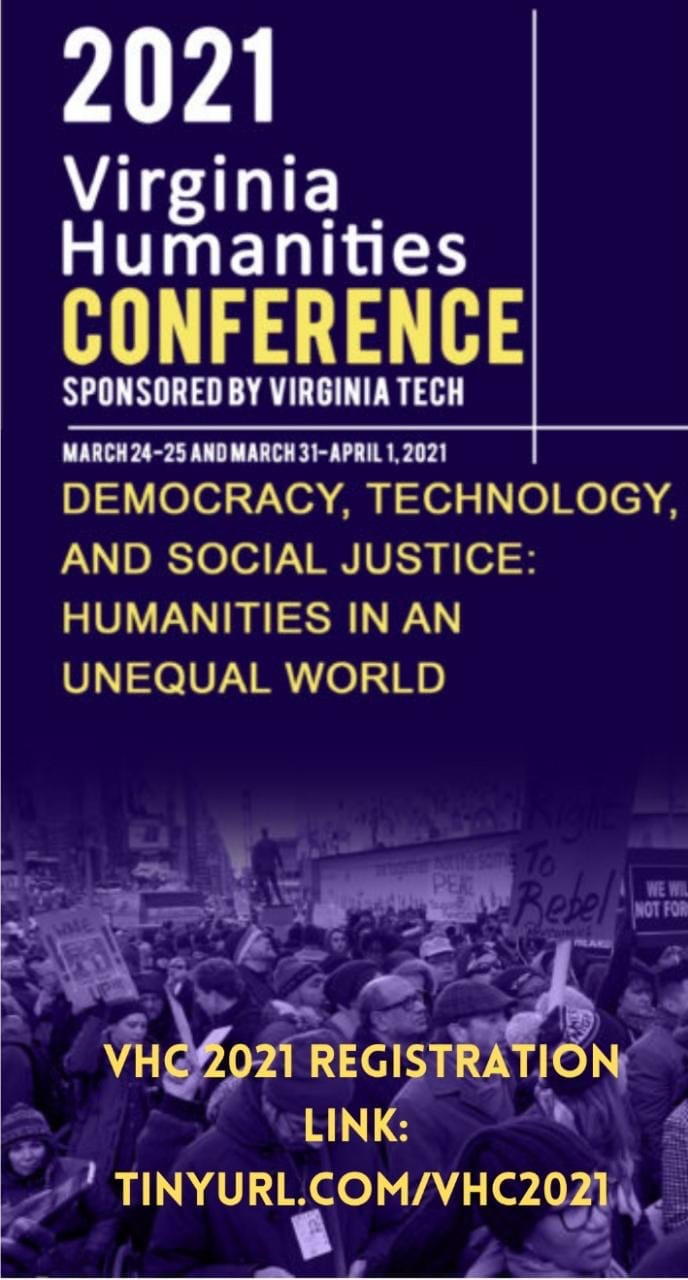A group of Marymount University faculty members and graduate students are presenting research at the 2021 Virginia Humanities Conference. The event launched on March 25 and is being held virtually over the span of two weeks.
Marymount is an institutional member of the Virginia Humanities Conference, an organization of universities, colleges and community colleges in the Commonwealth with the goal of promoting interest and research in the humanities.
Three Marymount professors in the College of Sciences and Humanities and three doctoral candidates are sharing their research during four virtual conference sessions. These professors include Dr. Tonya-Marie Howe, Dr. Judith Rogers-Fruiterman and Dr. Matthew Shadle. Graduate students include Osei Hyiamang, Brandi Fabel and Emmanuel Wansi, all of whom are pursuing doctorate degrees in Cybersecurity from the College of Business, Innovation, Leadership and Technology.
This year’s conference is titled, “Democracy, Technology, Social Justice: The Humanities in an Unequal World.”
“Anytime any one of us can be a part of an effort to shed light on how to create better systems and institutions that protect and support the health of all people equally, it is an opportunity to be part of something important,” Dr. Rogers-Fruiterman explained.
Dr. Rogers-Fruiterman served as a panelist for a discussion on the topic of technology, health and human security. Her presentation, “Health Disparities Considered in the Context of Social Justice,” highlights how social inequalities foster health inequity, and that improvements at a policy level are imperative.
On a panel discussing ethics, justice and cyber systems, Dr. Shadle presented his research, “Autonomous Weapons Systems and Moral Reasoning on the Battlefield.” He examines how autonomous weapons systems are equipped with artificial intelligence that has the ability to identify targets on the battlefield and strike them without a human operator present.
“There are good reasons not to leave life-and-death decision making to artificial intelligence, reasons that the humanities are especially well-suited to help us understand,” Dr. Shadle said. “I think it’s important to show how the integrated, liberal arts approach we take at Marymount University can be applied to a complex technological issue like the use of artificial intelligence in warfare.”
Hyiamang also contributed to the panel with his presentation, “How Would Cybersecurity Protect Election Integrity in Transitional Democracies?”
In her first time presenting at the conference, Fabel discussed human factor considerations when developing new computer systems. Her presentation, “Human Factors Engineering: Taking a Close Look at Human Computer Interaction (HCI),” emphasizes the need for analysts to know their audience and ensure that humanities requirements are part of the software development life cycle.
“It’s exciting to present on human factors because it has needed to be addressed for too long,” Fabel said. “In this era of the Internet of things, it’s important to create and develop systems using user-forward thinking. This means watching for things like dashboard overload and systems that may need multiple human languages.”
Dr. Howe’s research, “Tools for Critical Digital Literacy: The Promise of OER,” was presented in a panel surrounding democracy, gender and literacy. She examined the need for Open Education Resources (OER) that speak to the flexibility and adaptability needed by text-based disciplines like literature, and questioned why the literary field has been slow to adopt OER. Dr. Howe argued that OER is a promising tool for shaping digitally and informationally literate individuals, using her project, “Literature in Context: An Open Anthology of Literature in English,” developed in collaboration with faculty at the University of Virginia, as an example.
“The work of the Open Education Movement would seem to be a good direction as we seek not only to level the playing field by using free and open-access materials, but also to encourage critical thinking about the content found on the web,” Dr. Howe notes.
Wansi will present his research, “Tech Firms and First Amendments,” during a panel on Big Tech, ecofascism and public interest on April 1. His research examines First Amendment rights as it relates to technology companies, like Facebook and Google. After the U.S. Capitol riot event on January 6, Wansi notes that companies like Facebook started to place more restrictions against hate speech. He concludes that it may be reasonable to revise laws for regulating hate speech in cyberspace.
“I am excited to present at this conference and offer a new way of examining civic duties in the current climate,” Wansi said. “Some of the core issues which persisted years ago have not gone away but, instead, continued evolving.”
For more information on the Virginia Humanities Conference, click here.






